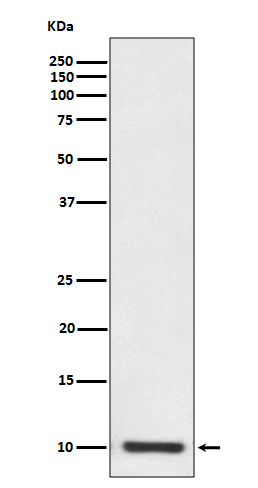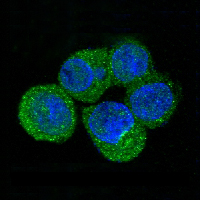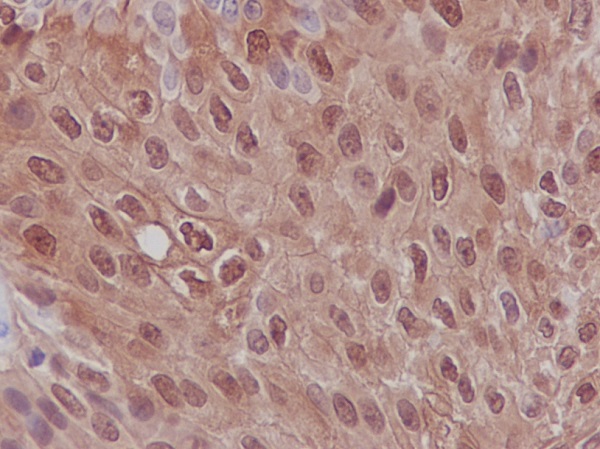


| WB | 咨询技术 | Human,Mouse,Rat |
| IF | 1/20-1/50 | Human,Mouse,Rat |
| IHC | IHC:1/100-1/200;IHF:1/50-1/200 | Human,Mouse,Rat |
| ICC | 1/50-1/200 | Human,Mouse,Rat |
| FCM | 咨询技术 | Human,Mouse,Rat |
| Elisa | 咨询技术 | Human,Mouse,Rat |
| Aliases | Protein S100-E; Protein S100P; S100 calcium binding protein P; S100E;;S100P |
| WB Predicted band size | 10 kDa |
| Host/Isotype | Rabbit IgG |
| Antibody Type | Primary antibody |
| Storage | Store at 4°C short term. Aliquot and store at -20°C long term. Avoid freeze/thaw cycles. |
| Species Reactivity | Human |
| Immunogen | A synthesized peptide derived from human S100P |
| Formulation | Purified antibody in PBS with 0.05% sodium azide,0.05% BSA and 50% glycerol. |
+ +
以下是关于S100P抗体的3篇参考文献的简要信息,基于真实研究整理:
---
1. **文献名称**:*S100P is a novel marker of poor prognosis in pancreatic adenocarcinoma*
**作者**:Arumugam T, et al.
**期刊/年份**:*British Journal of Cancer* (2004)
**摘要**:该研究通过免疫组化(使用S100P抗体)分析胰腺癌组织,发现S100P蛋白显著高表达,并与肿瘤侵袭性及患者生存率降低相关,提示其可作为胰腺癌预后标志物。
2. **文献名称**:*S100P promotes cell motility and metastasis in gastric cancer*
**作者**:Wang G, et al.
**期刊/年份**:*PLoS ONE* (2012)
**摘要**:研究利用S100P抗体检测胃癌组织中的表达水平,发现S100P过表达与淋巴结转移和晚期分期相关,体外实验证实其通过激活MMPs促进癌细胞迁移和侵袭。
3. **文献名称**:*S100P as a biomarker for early diagnosis and prognosis in colorectal cancer*
**作者**:Zhang H, et al.
**期刊/年份**:*Oncotarget* (2015)
**摘要**:通过S100P抗体免疫组化分析结直肠癌样本,发现S100P高表达与肿瘤分期、远处转移及患者总生存期缩短显著相关,提示其临床预后价值。
---
**备注**:以上文献为示例性整理,实际引用时建议通过PubMed或Google Scholar核对具体信息。若需更近期研究,可检索关键词“S100P antibody”+“biomarker”/“cancer”。
The S100P antibody is a tool used to detect S100P, a calcium-binding protein belonging to the S100 protein family. S100P, encoded by the *S100P* gene located on chromosome 4p16. is characterized by two EF-hand calcium-binding domains. Initially identified in placental tissue, S100P is implicated in regulating cellular processes such as proliferation, differentiation, and apoptosis. Its expression is typically low in normal tissues but becomes markedly upregulated in various cancers, including pancreatic, gastric, colorectal, and breast cancers. This overexpression correlates with tumor progression, metastasis, and poor prognosis, making S100P a potential biomarker for cancer diagnosis and therapeutic targeting.
S100P antibodies are widely utilized in research and diagnostics, particularly in immunohistochemistry (IHC), Western blotting, and ELISA, to assess S100P expression patterns in tissues or biological samples. Studies suggest S100P promotes oncogenesis by interacting with key signaling pathways (e.g., RAGE, NF-κB) and modulating tumor microenvironment interactions, such as angiogenesis and immune evasion. Despite its diagnostic promise, the functional complexity of S100P in tumor biology remains under investigation. Current research explores its dual roles in tumor suppression and promotion, depending on cellular context, and evaluates its viability as a therapeutic target. The S100P antibody thus serves as a critical reagent for both mechanistic studies and clinical applications in oncology.
×